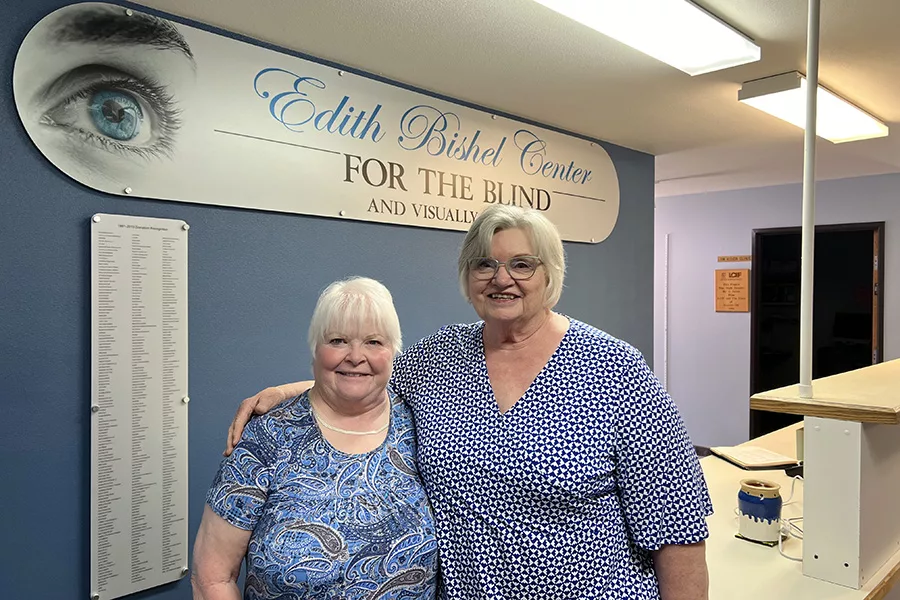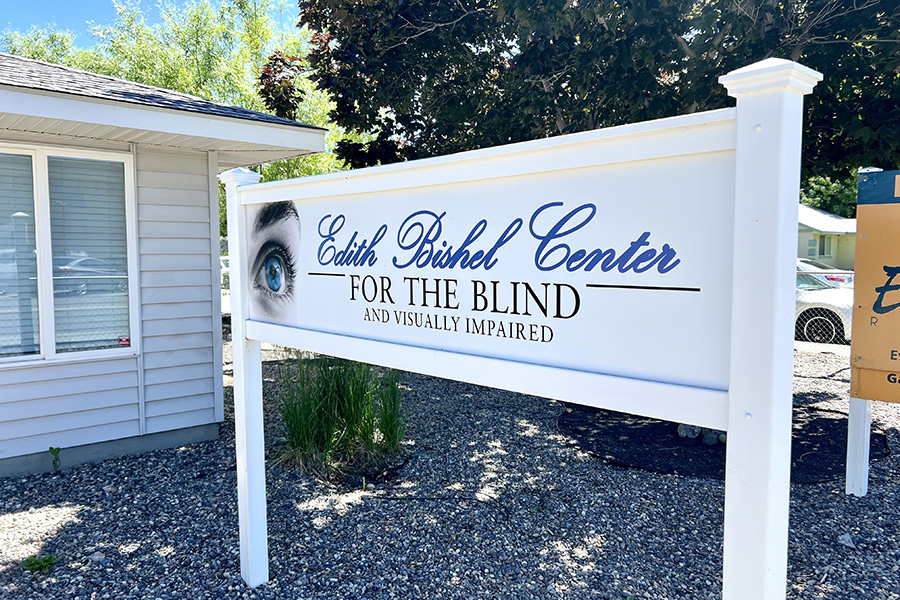
Home » Nonprofit serving the blind and visually impaired to close
‘We made it longer than we thought.’
Nonprofit serving the blind and visually impaired to close

The Edith Bishel Center for the Blind and Visually Impaired in Kennewick is closing at the end of August 2024 after nearly 30 years. From left are Kris Call, board president, and Shanna Larter, executive administrator.
Photo by Sara SchillingJune 14, 2024
A Tri-Cities nonprofit dedicated to serving people in the region with significant vision challenges is closing at the end of August after nearly three decades in operation.
The Edith Bishel Center for the Blind and Visually Impaired was hit hard by the Covid-19 pandemic, said Kris Call, board president. “That’s where our culprit really falls,” she said, adding that other factors – including the loss of a state contract – contributed.
The center plans a drop-in event on Aug. 9 for past board members, employees, volunteers, donors, clients and other interested community members to say goodbye. The event will run from noon to 3 p.m. at the Round Table Pizza at 1769 Leslie Road in Richland.
The Edith Bishel center provided everything from optometric low-vision exams to independent living and low-vision aids, social activities, support groups, low-vision iPhone and iPad training, community resources, reading assistance and equipment.
It opened at 628 N. Arthur St., Kennewick in 1995. Its namesake, Edith L. Bishel, bequeathed land and money for the facility upon her death.
Now that the nonprofit is dissolving, the 3,154-square-foot building near Kamiakin High School is on the market for $450,000. Gayle Stack of Everstar Realty is the listing agent.
Shanna Larter, the center’s executive administrator, said proceeds will go toward covering any remaining bills. Any money beyond that will be donated to nonprofit groups in the state that provide services similar to Edith Bishel, Larter told the Tri-Cities Area Journal of Business.
Larter joined the nonprofit about a decade ago and currently is the only employee.

The Edith Bishel Center for the Blind and Visually Impaired is closing at the end of August 2024 after nearly 30 years. The building at 628 N. Arthur St., Kennewick, is on the market.
| Photo by Sara SchillingShe turns 70 this year and is planning to retire as the center dissolves.
She started out at the nonprofit as a part-time administrative assistant and eventually became office manager and then executive administrator.
She loves the center and the work, she said. Its mission and services fill a need, and it’s emotional to move toward dissolution, she said.
“We’ve helped enrich people’s lives by giving them independence and the ability to connect with the world instead of being isolated,” Larter said.
The center also helped educate the greater community about blindness and visual impairments, including through its annual Dinner in the Dark fundraiser.
Tight budgets
The center has operated on an increasingly tight budget, and it was moving toward closure a few years back when a last-minute bequest temporarily saved the day, Call said. But relying on bequests and donations wasn’t sustainable and the agency doesn’t have sufficient income, she added. The center did have a state contract for some in-home services, but that ended a few years ago after the employee providing the work left.
The agency’s Form 990s, documents filed by nonprofit agencies with the Internal Revenue Service, show tight margins in recent years. Its budget has hovered around $100,000 since 2021. Last year, the center had a net income of $7,468 after expenses.
In 2020, its revenue was $125,848 and its net income was $14,112 in the red.
“We made it longer than we thought. We’re trying to look at the good side,” Call said, noting that the center has helped many people over the years and continues to do so.
As it nears closure, it’s pointing clients to other resources in the region. It also brightened the day of 42 low-income clients who’d been renting magnifiers to help enlarge print when it turned those rentals into gifts.
In its 29 years, the nonprofit made a mark, leaders said.
“We have shared many days of joy and sorrow with those whose lives have been touched by vision loss – from the sorrow and grief of first learning about the loss to the joy of finding something that helped make their lives more independent and enjoyable,” they wrote in the closure announcement. “We thank you for all those opportunities through the years.”
Latest News Local News Charitable Giving & Nonprofits
KEYWORDS June 2024
Related Articles
Related Products





